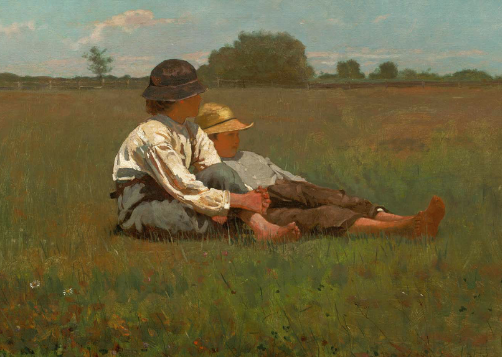Random Usually Has Its Reasons: The Mystery of the Three Routes Home
Winslow Homer, Boys in a Pasture
I was delighted to have My-Mate-Andy as a friend.
At first glance you wouldn’t imagine we had a lot in common.
My-Mate-Andy was the coolest kid in school. He had a golden tan, artfully ripped jeans, and was a connoisseur of the immaculate white t-shirt. He experimented with Sun-In in his hair and only wore Fu Shoes on his feet. He’d painted a Coca-Cola can in art class and decorated his parka with a replica of The Beat logo. He had a way with words, a lust for life, an enthusiasm for Marks & Spencer prawn cocktail crisps and George Benson records.
I was a swotty kid who helped people with their Latin homework in order to earn affection. I was always carrying books and kit in random Sainsbury’s bags. I was generally awkward, introverted, poorly shod. And my hair was a mess.
One thing we certainly had in common was our walk home from school. Every afternoon we traipsed along the Southend Arterial, past the tatty allotments and through the suburban semis of Cecil Avenue. We’d chat about music, football, politics and telly; about Evelyn ‘Champagne’ King, Boys from the Black Stuff, cold turkey, chips and beans. My-Mate-Andy would recite Jam lyrics and break into impromptu dance moves. He’d run through his impersonations of Ferg, Perc and Tony Papp. He’d tell me about the parties he’d attended, the girls he fancied and more besides. (I wasn’t very advanced in that department.)
My-Mate-Andy lived closer to the school, and so I would be left to walk the latter part of the journey home on my own. He had three slightly different, equidistant routes available to him, and each one required him to say farewell at a different point. With time I became quite fascinated by his choice of these three routes. He seemed to select a different option from one day to the next. But I couldn’t work out why.
Was his preference driven by meteorological conditions, his homework obligations, or what was on the telly? Was it related to road traffic, star signs, or what Jean had planned for dinner that night?
None of my hypotheses quite worked. There didn’t seem to be a particular pattern or logic. My-Mate-Andy’s route home was just completely random.
And then one day I cracked it. I realised that his decision on when to split was determined by the quality of our conversation. If words were flowing freely, and laughs were coming spontaneously, then he’d hang on ‘til the last possible exit. But if I was serving up rather dull discussion, mediocre fare, he’d take the first chance to break free.
This put the pressure on. I wondered: Could I make him select the farthest point of departure more often? Could I sustain his interest with the force of my witty repartee? Each afternoon I embarked on the walk home with a selection of perfectly polished conversational gambits to hand, in hope and expectation. But the harder I tried, the more likely he was to leave early.
I concluded that I ought be more natural with my friends.
But the real lesson was this: that cryptic or mysterious events often have a motive or explanation; that in the midst of seeming disorder there is sometimes shape and design; that random usually has its reasons.
And I think that is the challenge for a Strategist: find connections, causes, method and meaning in the everyday. Where others see chance and happenstance, we should seek rhyme and reason; where others see accident and the arbitrary, we should find patterns and plans.
Why is that sector behaving oddly? Why is the data different at that time of year? Why is that segment out of step with everyone else? Keep asking: Why? Why? Why? There’s usually a perfectly sensible explanation just over the horizon - if you have the instinct and appetite to look.
I’m still very good friends with My-Mate-Andy. We meet occasionally for a non-artisanal beer, and talk about music, football, politics and telly. He still has a healthy glow, and my hair’s still a mess. He denies that there was ever any logic to his route home - he was just ringing the changes. I maintain that he’s suffering from ‘unconscious bias.’
There’s no substitute for old friends. Old school is the best school. Or as George Benson once elegantly put it: ‘Never give up on a good thing.’
‘Never give up on a good thing.
Remember what makes you happy.
Never give up on a good thing.
If love is what you got, you got the lot.’
George Benson, Never Give Up on a Good Thing (Michael Garvin/Tom Shapiro)
No. 153
